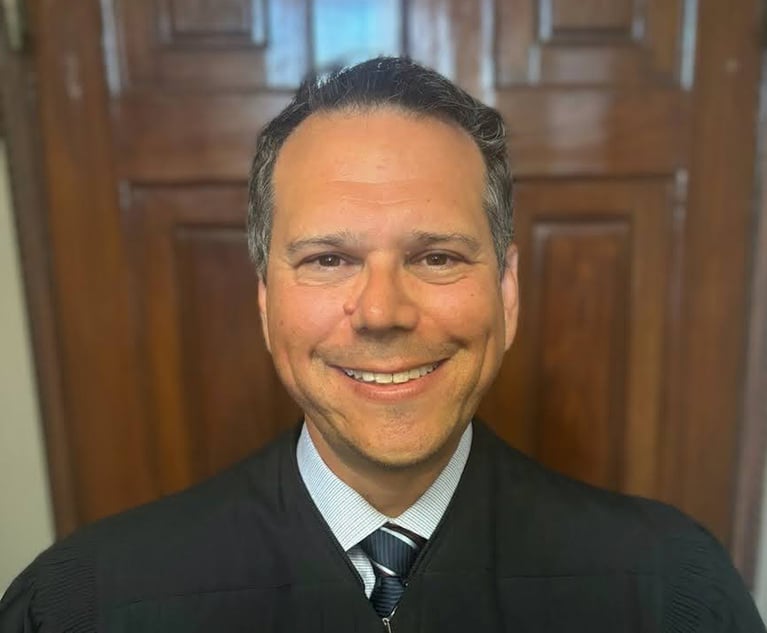 U.S. Supreme Court building in Washington, D.C. Photo: Diego M. Radzinschi/NLJ
U.S. Supreme Court building in Washington, D.C. Photo: Diego M. Radzinschi/NLJCircuit Split Tees Up SCOTUS Fight on Whether Judges Are Policymakers
A Third Circuit decision striking Delaware's "politically-balanced" state courts is the focus of a U.S. Supreme Court petition.
September 05, 2019 at 06:27 PM
5 minute read
The original version of this story was published on National Law Journal
The question of whether judges are "policymakers" is at the heart of a U.S. Supreme Court case considered critical to Delaware courts' "politically balanced" structure, as well as their national reputation as an objective forum for business disputes.
The federal appellate courts are divided on the question, which also has as a backdrop in a similar ongoing political debate over whether to restructure the Supreme Court and whether as Chief Justice John Roberts Jr. has proclaimed: "We do not have Obama judges or Trump judges, Bush judges or Clinton judges."
In Carney v. Adams, Delaware Gov. John Carney, represented by former federal appellate judge Michael McConnell of Stanford Law School, is asking the high court to reverse an April decision by the U.S. Court of Appeals for the Third Circuit. The unanimous panel there struck down the state constitution's political balance requirements that limit judges affiliated with any one political party to no more than a "bare majority" on the state's three highest courts, with the other seats reserved for judges affiliated with the "other major political party."
In his petition, McConnell tells the justices that Delaware's Constitution has required a politically balanced judiciary for more than 120 years. The Third Circuit's decision not only threatens Delaware courts' reputation for unbiased decision-making, he wrote, but its reasoning could jeopardize political balance on numerous boards or commissions by allowing an appointing official "to pack the entity with political cronies—thus endangering the constitutionality of hundreds of federal, state, and local good-government reform provisions."
The case stems from a lawsuit filed by Delaware lawyer James Adams, who considers himself an Independent. Adams challenged the constitution's provisions because, he argued, they effectively limit service on state courts to members of the Democratic and Republican parties. He contends that restricts a judicial candidate's First Amendment freedom to associate with the political party of his or her choice.
Delaware's governor countered that because judges are policymakers, there are no constitutional restraints on his hiring decisions. Carney argued he was free to choose candidates based on whether they belong to one of the two major political parties in Delaware.
But the panel, led by Judge Julio Fuentes of the U.S. Court of Appeals for the Third Circuit, ruled that judges are not policymakers. It relied primarily on two U.S. Supreme Court decisions on when political party affiliation is an appropriate condition of employment and an exception for "policymakers"—Elrod v. Burns and Branti v. Finkel.
"The purpose of the policymaking exception [to Elrod and Branti] is to ensure that elected officials may put in place loyal employees who will not undercut or obstruct the new administration," wrote Fuentes. "Judges simply do not fit this description. To the extent that Delaware judges create policy, they do so by deciding individual cases and controversies before them, not by creating partisan agendas that reflect the interests of the parties to which they belong."
The panel also rejected the governor's argument that even if judges are not policymakers, their political affiliation is a valid condition of state employment. "We need not dwell long on whether Delaware possesses a 'vital state interest' in a politically balanced judiciary, because Delaware's practice of excluding Independents and third party voters from judicial employment is not narrowly tailored to that interest," added Fuentes.
The Third Circuit's view of policymaking is narrow "but in a funny way," said McConnell in an interview. "Essentially they say partisan affiliation can be considered only when the position is one where the officeholder should carry out the will of the appointing official," he said. But consider a regulatory commission with a political balance requirement, he suggested. "The whole point is we don't want all the commissioners to be working the will of appointing officials," said McConnell. "For the Third Circuit, it makes that office not a policymaking office which in many ways turns the whole doctrine on its head."
The Third Circuit decision conflicts with decisions by the Sixth and Seventh circuits on whether judges are policymakers, the petition states. The justices should use this case to bring the Third Circuit into line with other courts as well as to clarify the scope of the Elrod-Branti doctrine, wrote McConnell.
The petition also argues judges are policymakers in several ways. For example, common law judging has a significant policy-making element. "The Third Circuit might have thought that labeling state court judges 'policymakers' would sound pejorative," added McConnell. "In reality, however, judges are among the most important decisionmakers in our legal-political system. If any judges make law, state common law judges certainly do."
Delaware's political balance requirements also protect against so-called "panel effect" by reducing ideologically homogeneous courts. "That is an 'appropriate' use of partisan affiliation in light of the policy-making role of courts in our society," states the petition.
And, McConnell also makes a federalism argument, telling the justices that federal courts are obligated to respect states' sovereign authority to structure their own governments, "including by setting qualifications for state judges."
A response to the petition has not yet been filed. Adams was represented in the Third Circuit by David Finger of Wilmington's Finger & Slanina.
This content has been archived. It is available through our partners, LexisNexis® and Bloomberg Law.
To view this content, please continue to their sites.
Not a Lexis Subscriber?
Subscribe Now
Not a Bloomberg Law Subscriber?
Subscribe Now
NOT FOR REPRINT
© 2024 ALM Global, LLC, All Rights Reserved. Request academic re-use from www.copyright.com. All other uses, submit a request to [email protected]. For more information visit Asset & Logo Licensing.
You Might Like
View All
Litigators of the Week: Simpson Thacher and ACLU Team To Challenge Louisiana's Ten Commandments Law

A Reporter and a Mayor: Behind the Scenes During the Eric Adams Indictment News Cycle

Even With New Business Courts, Texas Is a Long Way from Taking Delaware's Corporate Law Mantle
5 minute read
Trending Stories
Who Got The Work
Michael G. Bongiorno, Andrew Scott Dulberg and Elizabeth E. Driscoll from Wilmer Cutler Pickering Hale and Dorr have stepped in to represent Symbotic Inc., an A.I.-enabled technology platform that focuses on increasing supply chain efficiency, and other defendants in a pending shareholder derivative lawsuit. The case, filed Oct. 2 in Massachusetts District Court by the Brown Law Firm on behalf of Stephen Austen, accuses certain officers and directors of misleading investors in regard to Symbotic's potential for margin growth by failing to disclose that the company was not equipped to timely deploy its systems or manage expenses through project delays. The case, assigned to U.S. District Judge Nathaniel M. Gorton, is 1:24-cv-12522, Austen v. Cohen et al.
Who Got The Work
Edmund Polubinski and Marie Killmond of Davis Polk & Wardwell have entered appearances for data platform software development company MongoDB and other defendants in a pending shareholder derivative lawsuit. The action, filed Oct. 7 in New York Southern District Court by the Brown Law Firm, accuses the company's directors and/or officers of falsely expressing confidence in the company’s restructuring of its sales incentive plan and downplaying the severity of decreases in its upfront commitments. The case is 1:24-cv-07594, Roy v. Ittycheria et al.
Who Got The Work
Amy O. Bruchs and Kurt F. Ellison of Michael Best & Friedrich have entered appearances for Epic Systems Corp. in a pending employment discrimination lawsuit. The suit was filed Sept. 7 in Wisconsin Western District Court by Levine Eisberner LLC and Siri & Glimstad on behalf of a project manager who claims that he was wrongfully terminated after applying for a religious exemption to the defendant's COVID-19 vaccine mandate. The case, assigned to U.S. Magistrate Judge Anita Marie Boor, is 3:24-cv-00630, Secker, Nathan v. Epic Systems Corporation.
Who Got The Work
David X. Sullivan, Thomas J. Finn and Gregory A. Hall from McCarter & English have entered appearances for Sunrun Installation Services in a pending civil rights lawsuit. The complaint was filed Sept. 4 in Connecticut District Court by attorney Robert M. Berke on behalf of former employee George Edward Steins, who was arrested and charged with employing an unregistered home improvement salesperson. The complaint alleges that had Sunrun informed the Connecticut Department of Consumer Protection that the plaintiff's employment had ended in 2017 and that he no longer held Sunrun's home improvement contractor license, he would not have been hit with charges, which were dismissed in May 2024. The case, assigned to U.S. District Judge Jeffrey A. Meyer, is 3:24-cv-01423, Steins v. Sunrun, Inc. et al.
Who Got The Work
Greenberg Traurig shareholder Joshua L. Raskin has entered an appearance for boohoo.com UK Ltd. in a pending patent infringement lawsuit. The suit, filed Sept. 3 in Texas Eastern District Court by Rozier Hardt McDonough on behalf of Alto Dynamics, asserts five patents related to an online shopping platform. The case, assigned to U.S. District Judge Rodney Gilstrap, is 2:24-cv-00719, Alto Dynamics, LLC v. boohoo.com UK Limited.
Featured Firms
Law Offices of Gary Martin Hays & Associates, P.C.
(470) 294-1674
Law Offices of Mark E. Salomone
(857) 444-6468
Smith & Hassler
(713) 739-1250






